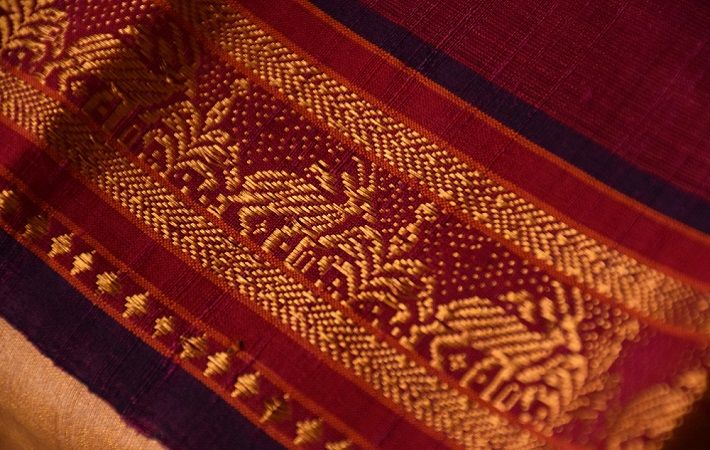Indian brands help handloom artisans, weavers recover from COVID-19

Amid production delays and order cancellations by major companies, various Indian brands joined forces with handloom workers and artisans to keep them afloat.
Indian online fashion brand Tjori worked closely with weaver teams and helped them by providing projects, selling products on its website, and providing insights and knowledge enhancements. On the other hand, Yes!poho, a social impact-based social commerce digital platform, worked to enhance the livelihood and socio-economic conditions of artisans through direct connection with clients and the use of technologies such as AR/VR and S-Commerce to develop trust and relationships.
“There is no denying that the whole scenario has only added to the pain of the local craftsmen and artisans. Wholesale buyers and businesses have shut down due to which payments have not been made. Weavers have lost wages and in the absence of raw materials and working capital, there is no certainty about when they can begin again. The colossal dip in economic activity, income cuts, reduced number of social gatherings and customer demand has made it difficult for them to stay afloat,” Mansi Gupta, founder & CEO of Tjori told Fibre2Fashion.
Talking about the initiatives taken by Tjori to help the artisans, Gupta said, “As a brand, Tjori aims to preserve and improve their traditional lifestyles. Operating out of Delhi, Tjori works towards creating opportunities, both financial and community-based for the craftsmen. We want to help create sustainable jobs and empower women themselves to become self-sufficient. The organisation seeks to empower those who have been neglected by society and denied these opportunities, especially women from urban slums.
“The company is also working to meet the environmental requirements of India and international fair-trade organisations that is vital to the bigger global trade picture. Tjori usually works with independent artisans and weavers along with small rural artisans to revive dying art and crafts.”
Tjori collaborates directly with manufacturers, suppliers, artisans, and craftsmen and exhibits exquisite items from hyper-local markets of the globe. “Contributing to our collections, our artisans and craftsmen are from India. We have created jobs for over 700 and they will grow as we grow. Instead of solely operating independently, we highly operated on the concept of #buylocal,” added Gupta.
Yes!poho founder and CEO Raghuram Kuchibhatla said: “Yes!poho believes that the best way to enhance artisan livelihoods is to work at the grassroots level, recognise their pain points, educate them on technology and tool use, and assist them in product sourcing. Our partner relationship team spends months educating and onboarding weavers onto the platform.”
Yes!poho works directly with artisans to ensure that inventory is controlled, orders are fulfilled on time, and payments are processed after they have been onboarded. The platform measures their livelihood at every step, and since its inception, they have improved their livelihoods by 20 per cent, expanded artisans' worldwide market access by nearly 30 per cent, and increased their average primary income by more than 20 per cent. “On Yes!poho platform, artists interact directly with clients, building trust and relationships, and thereby expanding their global reach,” added Kuchibhatla.
India’s homegrown e-commerce marketplace Flipkart is also doing its bit to help the artisans and weavers get over the impact of the pandemic. In November last year, it kicked off Flipkart Samarth, which is designed with the intention of democratising e-commerce and building a sustainable and inclusive platform for under-served, domestic communities to empower them with greater opportunities and better livelihood.
Through the initiative, Flipkart aims to provide greater visibility to the made-in-India products on its platform, products that reflect the local diversity, culture and capabilities of a heritage-rich country.
“We are proud to be able to support the rich heritage of India and provide MSMEs, artisans and craftsmen an opportunity to leverage the power of e-commerce,” said Rajneesh Kumar, chief corporate affairs officer at Flipkart, while speaking on the issue of market access for under-served seller communities on e-commerce platforms.
As part of its initiative, Flipkart has joined forces with the union territory of Jammu & Kashmir (J&K); Maharashtra Small Scale Industries Development Corporation (MSSIDC) and Maharashtra State Khadi & Village Industries Board (MSKVIB); Tamil Nadu micro, small and medium enterprises (MSME) trade and investment promotion bureau (MTIPB); state of Jharkhand; and Himachal Pradesh State Handicrafts & Handloom Corporation Limited (HPSHHCL) among others.
With these partnerships, Flipkart’s goal is to bring the state’s local artisans, weavers, handicraft and handloom makers into the e-commerce fold, and provide business and trade inclusion opportunities.
Fibre2Fashion News Desk (KD)
































-Ltd..jpg?tr=w-120,h-60,c-at_max,cm-pad_resize,bg-ffffff)





.jpg?tr=w-120,h-60,c-at_max,cm-pad_resize,bg-ffffff)
.jpg?tr=w-120,h-60,c-at_max,cm-pad_resize,bg-ffffff)






